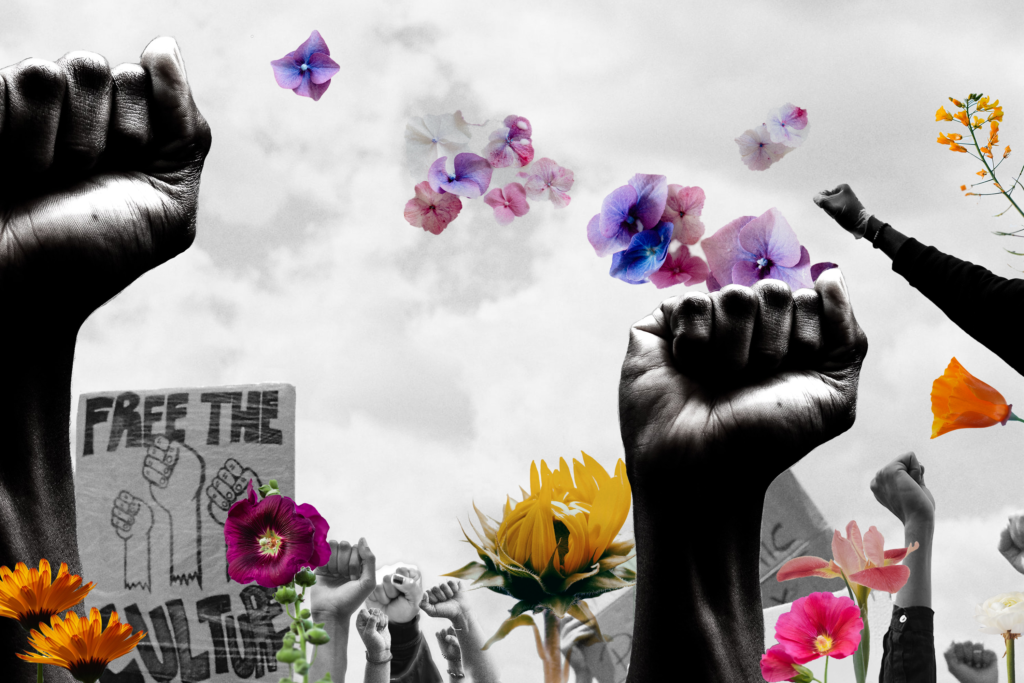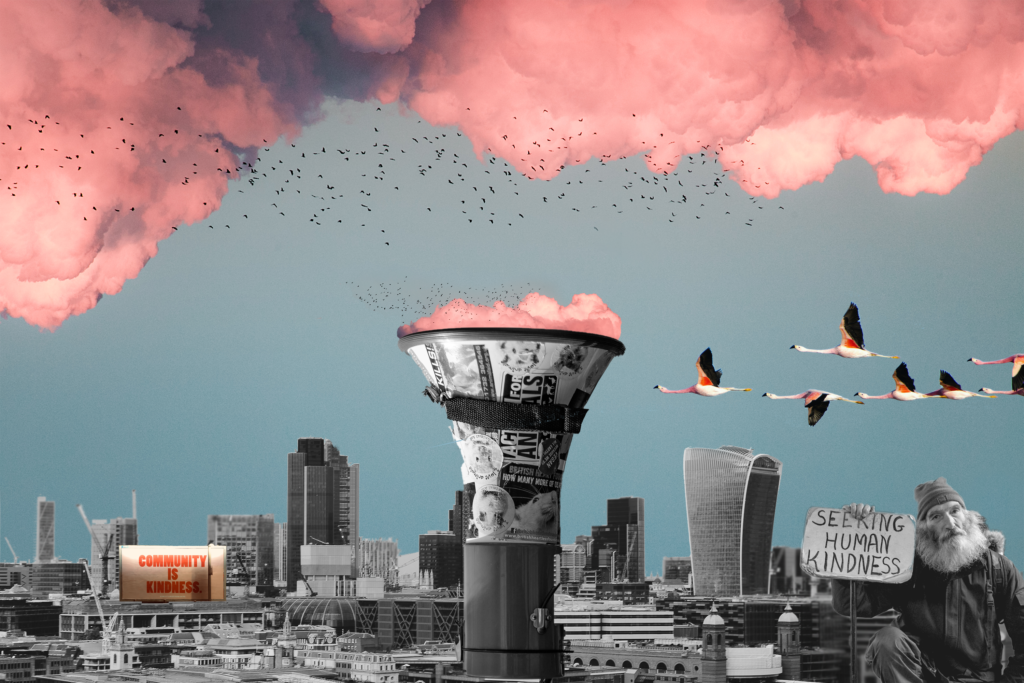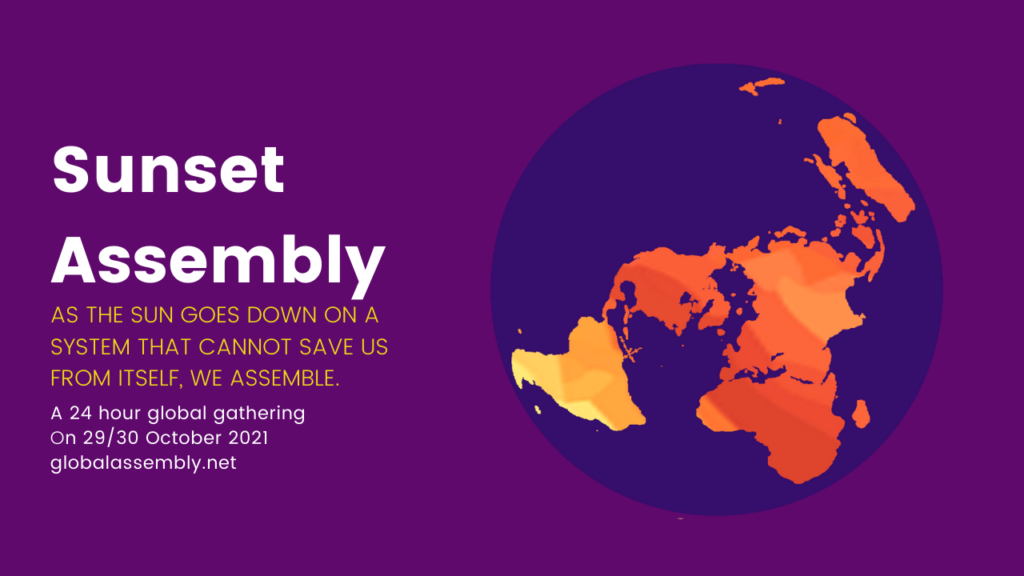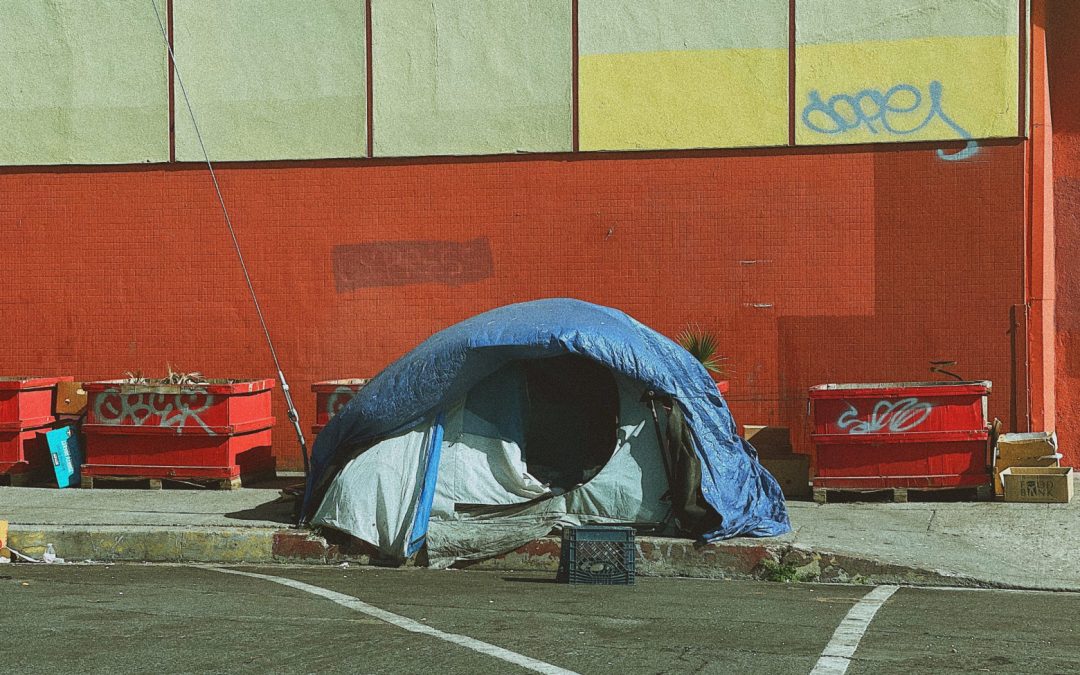
The Enclosure Movement
Editor’s note: This piece details the history of the enclosure movement, focusing on western civilization. Enclosure is an ongoing process by which land that was previously seen as collective, belonging to everyone or purely to nature, is privatized. Enclosure has long been a tenet of capitalism, and more broadly of civilization. Exploitation and destruction of land follows.
by Ian Angus
In 1542, Henry VIII gave his friend and privy councilor Sir William Herbert a gift: the buildings and lands of a dissolved monastery, Wilton Abbey near Salisbury. Herbert didn’t need farmland, so he had the buildings torn down, expelled the monastery’s tenants, and physically destroyed an entire village. In their place he built a large mansion, and fenced off the surrounding lands as a private park for hunting.
In May 1549, officials reported that people who had long used that land as common pasture were tearing down Herbert’s fences.
“There is a great number of the commons up about Salisbury in Wiltshire, and they have plucked down Sir William Herbert’s park that is about his new house, and diverse other parks and commons that be enclosed in that county, but harm they do to [nobody]. They say they will obey the King’s master and my lord Protector with all the counsel, but they say they will not have their commons and their grounds to be enclosed and so taken from them.”
Herbert responded by organizing an armed gang of 200 men, “who by his order attacked the commons and slaughtered them like wolves among sheep.”[1]
The attack on Wilton Abbey was one of many enclosure riots in the late 1540s that culminated in the mass uprising known as Kett’s Rebellion, discussed in Part Two. There had been peasant rebellions in England in the Middle Ages, most notably in 1381, but they were rare. As Engels wrote of the German peasantry, their conditions of life militated against rebellion. “They were scattered over large areas, and this made every agreement between them extremely difficult; the old habit of submission inherited by generation from generation, lack of practice In the use of arms in many regions, and the varying degree of exploitation depending on the personality of the lord, all combined to keep the peasant quiet.”[2]
Enclosure, a direct assault on the peasants’ centuries-old way of life, upset the old habit of submission. Protests against enclosure were reported as early as 1480, and became frequent after 1530. “Hundreds of riots protesting enclosures of commons and wastes, drainage of fens and disafforestation … reverberated across the century or so between 1530 and 1640.”[3]
Elizabethan authorities used the word “riot” for any public protest, and the label is often misleading. Most were actually disciplined community actions to prevent or reverse enclosure, often by pulling down fences or uprooting the hawthorn hedges that landlords planted to separate enclosed land.
“The point in breaking hedges was to allow cattle to graze on the land, but by filling in the ditches and digging up roots those involved in enclosure protest made it difficult and costly for enclosers to re-enclose quickly. That hedges were not only dug up but also burnt and buried draws attention to both the considerable time and effort which was invested in hedge-breaking and to the symbolic or ritualistic aspects of enclosure opposition. … Other forms of direct action against enclosure included impounding or rescuing livestock, the continued gathering of previously common resources such as firewood, trespassing in parks and warrens, and even ploughing up land which had been converted to pasture or warrens.”[4]
The forms of anti-enclosure action varied, from midnight raids to public confrontations “with the participants, often including a high proportion of women, marching to drums, singing, parading or burning effigies of their enemies, and celebrating with cakes and ale.”[5] (I’m reminded of Lenin’s description of revolutions as festivals of the oppressed and exploited.) Villagers were very aware of their rights — it was joked that some farmers read Thomas de Lyttleton’s Treatise on Tenures while ploughing — so physical assaults on fences and hedges were often accompanied by petitions and legal action.
Many accounts of what’s called the enclosure movement focus on the consolidation of dispersed strips of leased land into compact farms, but most enclosure riots actually targeted the privatization of the unallocated land that provided pasture, wood, peat, game and more. For cottagers who had no more than a small house and an acre or two of poor quality land, access to those resources was a matter of life and death. “Commons and common rights, so far from being merely a luxury or a convenience, were really an integral and indispensable part of the system of agriculture, a lynch pin, the removal of which brought the whole structure of village society tumbling down.”[6]
Coal wars
In the last decades of the 1500s, farmers in northern England faced a new threat to their livelihoods, the rapid expansion of coal mining, which many landlords found was more profitable than renting farmland. Thousands who were made landless by enclosure ultimately found work in the new mines, but the very creation of those mines required the dispossession of farmers and farmworkers. The search for coal seams left pits and waste that endangered livestock; actual mines destroyed pasture and arable land and polluted streams, making farming impossible.
The prospect of mining profits produced a new kind of enclosure — expropriation of mineral rights under common land. “Wherever coal-mining became important, it stimulated the movement towards curtailing the rights of customary tenants and even of small freeholders, and towards the enclosure of portions of the wastes.” In the landlords’ view, it wasn’t enough just to fence off the mining area, “not only must the tenants be prevented from digging themselves, they must be stripped of their power to refuse access to minerals under their holdings, or to demand excessive compensation.”[7]
As a result, historian John Nef writes, tenant farmers “lived in constant fear of the discovery of coal under their land,” and attempts to establish new mines were often met by sabotage and violence. “Many were the obscure battles fought with pitchfork against pick and shovel to prevent what all tenants united in branding as a mighty abuse.” Fences were torn down, pits filled in, buildings burned, and coal was carried off. In Lancashire, the enclosures surrounding one large mine were torn down sixteen times by freeholders who claimed “freedom of pasture.” In Derbyshire in 1606, a landlord complained that twenty-three men “armed with pitchforks, bows and arrows, guns and other weapons,” had threatened to kill everyone involved if mining continued on the manor.[8]
In these and many other battles, commoners heroically fought to preserve their land and rights, but they were unable to stop the growth of a highly-profitable industry that was supported physically by the state and legally by the courts. As elsewhere, capital defeated the commons.
Turning point
In the early 1500s, capitalist agriculture was new, and the landowning classes were generally critical of the minority who enclosed common land and evicted tenants. The commonwealth men whose sermons defended traditional village society and condemned enclosure were expressing, in somewhat exaggerated form, views that were widely held in the aristocracy and gentry. While anti-enclosure laws were drafted and introduced by the royal government, they were invariably approved by the House of Commons, which “almost by definition, represented the prospering section of the gentry.”[9]
As the century progressed, however, growing numbers of landowners sought to break free from customary and state restrictions in order to “improve” their holdings. In 1601, when Sir Walter Raleigh argued that the government should “let every man use his ground to that which it is most fit for, and therein use his own discretion,”[10] a large minority in the House of Commons agreed.
As Christopher Hill writes, “we can trace the triumph of capitalism in agriculture by following the Commons’ attitude towards enclosure.”
“The famine year 1597 saw the last acts against depopulation; 1608 the first (limited) pro-enclosure act. … In 1621, in the depths of the depression, came the first general enclosure bill — opposed by some M.P.s who feared agrarian disturbances. In 1624 the statutes against enclosure were repealed. … the Long Parliament was a turning point. No government after 1640 seriously tried either to prevent enclosures, or even to make money by fining enclosers.”[11]
The early Stuart kings — James I (1603-1625) and Charles I (1625-1649) — played a contradictory role, reflecting their position as feudal monarchs in an increasingly capitalist country. They revived feudal taxes and prosecuted enclosing landlords in the name of preventing depopulation, but at the same time they raised their tenants’ rents and initiated large enclosure projects that dispossessed thousands of commoners.
Enclosure accelerated in the first half of the 1600s — to cite just three examples, 40% of Leicestershire manors, 18% of Durham’s land area, and 90% of the Welsh lowlands were enclosed in those decades.[12] Even without formal enclosure, many small farmers lost their farms because they couldn’t pay fast rising rents. “Rent rolls on estate after estate doubled, trebled, and quadrupled in a matter of decades,” contributing to “a massive redistribution of income in favour of the landed class.”
It was a golden age for landowners, but for small farmers and cottagers, “the third, fourth, and fifth decades of the seventeenth century witnessed extreme hardship in England, and were probably among the most terrible years through which the country has ever passed.[13]
Fighting back
Increased enclosure was met by increased resistance. Seventeenth century enclosure riots were generally larger, more frequent, and more organized than in previous years. Most were local and lasted only a few days, but several were large enough to be considered regional uprisings — “the result of social and economic grievances of such intensity that they took expression in violent outbreaks of what can only be called class hatred for the wealthy.”[14]
The Midland Revolt broke out in April 1607 and continued into June. The rebels described themselves as “diggers” and “levelers,” labels later used by radicals during the civil war, and they claimed to be led by “Captain Pouch,” a probably mythical figure whose magical powers would protect them.[15] Martin Empson describes the revolt in his history of rural class struggle, Kill all the Gentlemen:
“Events in 1607 involved thousands of peasants beginning in Northamptonshire at the very start of May and spreading to Warwickshire and Leicestershire. Mass protests took place, involving 3,000 at Hilmorton in Warwickshire and 5,000 at Cotesback in Leicestershire. In a declaration produced during the revolt, The Diggers of Warwickshire to all other Diggers, the authors write that they would prefer to ‘manfully die, then hereafter to be pined to death for want of that which those devouring, encroachers do serve their fat hogs and sheep withal.’”[16]
These were well-planned actions, not spontaneous riots. Cottagers from multiple villages met in advance to discuss where and when to assemble, arranged transportation, and provided tools, meals and places to sleep for the rebels who would spend days tearing down fences, uprooting hedges and filling in ditches. Local militias could not stop them — indeed, “many members of the militia themselves became involved in the rising, either actively or by voting with their feet and failing to attend the muster.”[17]
The movement was only stopped when mounted vigilantes, hired by local landlords, attacked protestors near the town of Newton, massacring more than 50 and injuring many more. The supposed leaders of the rising were publicly hanged and quartered, and their bodies were displayed in towns throughout the region.
The Western Rising was less organized, but it lasted much longer, from 1626 to 1632. Here the focus was “disafforestation” — Charles I’s privatization of the extensive royal forests in which thousands of farmers and cottagers had long exercised common rights. The government appointed commissions to survey the land, propose how to divide it up, and negotiate compensation for tenants. The largest portions were leased to investors, mainly the king’s friends and supporters, who in turn rented enclosed parcels to large farmers.”[18]
Generally speaking, the forest enclosures seem to have been fair to freeholders and copyholders who could prove that they had common rights, but not to those who had never had formal leases, or couldn’t prove that they had. The formally landless were excluded from the negotiations and from the land they had worked on all their lives.
For at least six years, landless workers and cottagers fought to prevent or reverse enclosures in Dorset, Wiltshire, Gloucestershire, and other areas where the crown was selling off public forests.
“The response of the inhabitants of each forest was to riot almost as soon as the post-disafforestation enclosure had begun. These riots were broadly similar in aim and character, directed toward the restoration of the open forest and involving destruction of the enclosing hedges, ditches, and fences and, in a few cases, pulling down houses inhabited by the agents of the enclosers, and assaults on their workmen.”[19]
Declaring “here were we born and here we will die,” as many as 3,000 men and women took part in each action against forest enclosures. Buchanan Sharp’s study of court records shows that the majority of those arrested for anti-enclosure rioting identified themselves not as husbandmen (farmers) but as artisans, particularly weavers and other clothworkers, who depended on the commons to supplement their wages. “It could be argued that there were two types of forest inhabitants, those with land who went to law to protect their rights, and those with little or no land who rioted to protect their interests.”[20]
The longest continuing fight against enclosure took place in eastern England, in the fens. From the 1620s to the end to the century, thousands of farmers and cottagers resisted large-scale projects to drain and enclose the vast wetlands that covered over 1400 square miles in Lincolnshire and adjacent counties. Aiming to create “new land” that could be sold to investors and rented to large tenant farmers, the drainage projects would dispossess thousands of peasants whose lives depended on the region’s rich natural resources.
The result was almost constant conflict. Historian James Boyce describes what happened in 1632, when constables tried to arrest opponents of draining a 10,000 acre common marsh, in the Cambridgeshire village of Soham:
“The constables charged with arresting the four Soham resistance leaders so delayed entering the village that they were later charged for not putting the warrant into effect. When they finally sought to do so, an estimated 200 people poured onto the streets armed with forks, staves and stones. The next day a justice ordered 60 men to support the constables in executing the warrant but over 100 townspeople still stood defiant, warning ‘that if any laid hands of any of them, they would kill or be killed’. When one of the four was finally arrested, the constables were attacked and several people were injured. A justice arrived in Soham on 11 June with about 120 men and made a further arrest before the justice’s men were again ‘beaten off, the rest never offering to aid them’. Another of the four leaders, Anne Dobbs, was eventually caught and imprisoned in Cambridge Castle but on 14 June 1633, the fight was resumed when about 70 people filled in six division ditches meant to form part of an enclosure. Twenty offenders were identified, of whom fourteen were women.”[21]
Militant and often violent protests challenged every drainage project. As elsewhere in England, fenland rioters uprooted hedges, filled ditches and destroyed fences, but here they also destroyed pumping equipment, broke open dykes, and attacked drainage workers, many of whom had been brought from the Netherlands. “By the time of the civil war the whole fenland was in a state of open rebellion.”[22]
Revolution in the revolution
For eleven years, from 1629 to 1640, Charles I tried to rule as an absolute monarch, refusing to call Parliament and unilaterally imposing taxes that were widely viewed as oppressive and illegal. When his need for more money finally forced him to call Parliament, the House of Commons refused to approve new taxes unless he agreed to restrictions on his powers. The king refused and civil war broke out in 1642, leading to Charles’s defeat and execution in 1649. From then until 1660, England was a republic.
Many histories of the civil was treat it as purely a conflict within the ruling elite: it often seems, Brian Manning writes, “as if the other 97 per cent of the population did not exist or did not matter.”[23] In fact, as Manning shows in The English People and the English Revolution, poor peasants, wage laborers and small producers were not just followers and foot soldiers — they were conscious participants whose actions influenced and often determined the course of events. The fight for the commons was an important part of the English Revolution.
“Between the assembling of the Long Parliament in·1640 and the outbreak of the civil war in 1642 there was a rising tide of protest and riot in the countryside. This was directed chiefly against the enclosures of commons, wastes and fens, and the invasions of common rights by the king, members of the royal family, courtiers, bishops and great aristocrats.”[24]
Between 1640 and 1644 there were anti-enclosure riots in more than half of England’s counties, especially in the midlands and north: “in some cases not only the fences but the houses of the gentry were attacked.”[25]
The wealthiest landowners were outraged. In July 1641, the House of Lords complained that “violent breaking into Possessions and Inclosures, in riotous and tumultuous Manner, in several Parts of this Kingdom,” was happening “more frequently … since this Parliament began than formerly.” They ordered local authorities to ensure “that no Inclosure or Possession shall be violently, and in a tumultuous Manner, disturbed or taken away from any Man,”[26] but their orders had little effect. “Constables not only repeatedly failed to perform their duties against neighbours engaged in the forcible recovery of their commons, but were also sometimes to be found in the ranks of the rioters themselves.”[27]
The rioters hated the landowners’ government and weren’t reluctant to say so. When an order against anti-enclosure riots was read in a church in Wiltshire in April 1643, for example, one parishioner stood and “most contemptuously and in dishonor of the Parliament and their authority said that he cared not for their orders and the Parliament might have kept them and wiped their arses with them.”[28]
In 1645, anti-enclosure protestors in Epworth, Lincolnshire, replied to a similar order that ‘”They did not care a Fart for the Order which was made by the Lords in Parliament and published in the Churches, and, that notwithstanding that Order, they would pull down all the rest of the Houses in the Level that were built upon those Improvements which were drained, and destroy all the Enclosures.”[29]
The most intense conflicts took place in the fens. To cite just one case, in February 1643, in Axholme, Lincolnshire, commoners armed with muskets opened floodgates at high tide, drowning over six thousand acres of recently drained and enclosed land, and then closed the gates to prevent the water from flowing out at low tide. Armed guards then held the position for ten weeks, threatening to shoot anyone who attempted to let the water out.[30]
Many more examples could be cited. The years 1640 to 1660 weren’t just a time of revolutionary civil war, they were decades of anti-enclosure rebellion.
Defeat
Two centuries later, in The Communist Manifesto, Marx and Engels wrote that “all previous historical movements were movements of minorities, or in the interests of minorities.” That was certainly true of the English Revolution — Parliament could not have overthrown the monarchy without the support of small producers, peasants and wage-workers, but the plebeians got little from the victory. As Digger leader Gerard Winstanley wrote to the “powers of England” in 1649: “though thou hast promised to make this people a free people, yet thou hast so handled the matter, through thy self-seeking humour, that thou has wrapped us up more in bondage, and oppression lies heavier upon us.”[31]
Since the king was one of the largest and most hated enclosers, many anti-enclosure protesters expected Parliament to support their cause, but their hopes were disappointed — no surprise, since almost all MPs were substantial landowners. Both houses of Parliament repeatedly condemned anti-enclosure riots, and no anti-enclosure measures were adopted during the civil war or by the republican regime in the 1650s. The last attempt to regulate (not prevent) enclosure occurred in 1656, when a Bill to do that was rejected on first reading: the Speaker said “he never liked any Bill that touched upon property,” and another MP called it “the most mischievous Bill that ever was offered to this House.”[32]
Like the royal government it replaced, the republican government in the 1650s raised revenue by selling off royal forests and supported the drainage and enclosure of the fens. It passed laws that eliminated all remaining feudal restrictions and charges on landowners, but made no changes to the tenures of farmers and cottagers. “Thus landlords secured their own estates in absolute ownership, and ensured that copyholders remained evictable.”[33]
In Christopher Hill’s words, in the seventeenth century struggle for land, “the common people were defeated no less decisively than the crown.”[34]
The last wave
There were sporadic anti-enclosure protests in the last years of the seventeenth century, especially in the fens, but for all practical purposes, the uprisings of 1640 to 1660 were the last of their kind. In the early 1700s, peasant resistance mostly involved illegally hunting deer or gathering wood on enclosed land, not tearing down fences. Long memories of brutal defeats, reinforced by fear of ruling class forces that were now even stronger, discouraged any return to mass action.
Until the mid-1700s, the large landlords who owned most of English farmland seem to have been more interested in reaping the rewards of previous victories than in enclosing the remaining open fields and commons. About a quarter of the country’s farmland was still worked in open fields in 1700, but so long as rents covered costs, with a substantial surplus, few landlords chose to make changes.
When a new wave of enclosures began about 1755, spurred first by falling grain prices and then by rising prices during Napoleonic wars, the social and economic context was very different. English capitalist society, we might say, had become more “civilized.” In place of the rough methods of earlier years, enclosure became a structured bureaucratic process, subject to political oversight and regulation. Enclosure required detailed surveys and plans prepared by lawyers and professional enclosure commissioners, all accepted by the owners and tenants of three-quarters of the land involved (which was often a small minority of the people affected), then written into a Bill which had to be approved by a Parliamentary committee and both houses of Parliament.
Marx referred to the resulting Enclosure Acts as “decrees by which the landowners grant themselves the peoples’ land as private property, decrees of expropriation of the people.”[35]
Most Parliamentary enclosures seem to have carefully followed the law, including fairly allocating land or compensation to leaseholders large and small, but the law did not recognize customary common rights. Just as with the cruder methods of previous centuries, Parliamentary enclosure didn’t just consolidate land: it eliminated common rights and dispossessed the landless commoners who depended on them. When a 20th century historian called this “perfectly proper,” because the law was obeyed and property rights protected, Edward Thompson replied:
“Enclosure (when all the sophistications are allowed for) was a plain enough case of class robbery, played according to fair rules of property and law laid down by a parliament of property-owners and lawyers. …
“What was ‘perfectly proper’ in terms of capitalist property-relations involved, none the less, a rupture of the traditional integument of village custom and of right: and the social violence of enclosure consisted precisely in the drastic, total imposition upon the village of capitalist property-definitions.”[36]
There were some local riots after enclosure was approved, often in the form of stealing or burning fence posts and rails, but as J.M. Neeson has shown, most resistance took the form of “stubborn non-compliance, foot-dragging and mischief,” before an enclosure Bill went to London. Villagers refused to speak to surveyors or gave them inaccurate information, sent threatening letters, stole record books and field plans, and in general tried to force delays or drive up the landlords’ costs. In some cases, villagers petitioned Parliament to reject the proposed bill, but that was expensive and rarely successful.[37]
Ultimately, however, the game was rigged. Sabotage might slow things down or win better terms, but landlords and large tenants who wanted to impose enclosure could always do so, and there was no right of appeal. Between 1750 and 1820 nearly 4,000 Enclosure Acts were passed, affecting roughly 6.8 million acres. Only a handful of open-field villages remained. Despite centuries of resistance, the power of capital prevailed: “the commons in England were gradually driven out of existence, the small farms engrossed, the land enclosed, and the commoners forcibly removed.”[38]
Continuing enclosure
As Marx wrote, “the expropriation of the mass of the people from the soil forms the basis of the capitalist mode of production.” People who can produce all or most of their own subsistence are independent in ways that are alien to capitalism — they are under no economic compulsion to work for wages. As an advocate of enclosure wrote in 1800, “when a labourer becomes possessed of more land than he and his family can cultivate in the evenings … the farmer can no longer depend on him for constant work.”[39]
This series of articles has focused on England, where the expropriation involved a centuries-long war against the commons. It was the classic case of primitive accumulation, the “two transformations” by which “the social means of subsistence and production are turned into capital, and the immediate producers are turned into wage-laborers,”[40] but of course this is not the whole story. In other places, capitalism’s growth by dispossession occurred at different speeds and in different ways.
In Scotland, for example, enclosure didn’t begin until the mid-1700s, but then the drive to catch up with England ensured that it was much faster and particularly brutal. As Neil Davidson writes, the horrendous 19th century Highland Clearances that Marx so eloquently condemned in Capital involved not primitive accumulation by new capitalists, but the consolidation of “an existing, and thoroughly rapacious, capitalist landowning class … whose disregard for human life (and, indeed, ‘development’) marked it as having long passed the stage of contributing to social progress.”[41]
And, of course, the growth of the British Empire, from Ireland to the Americas to India and Africa, was predicated on enclosure of colonized land and dispossession of indigenous peoples. As Rosa Luxemburg wrote, extending the “blight of capitalist civilization” required
“the systematic destruction and annihilation of all the non-capitalist social units which obstruct its development .… Each new colonial expansion is accompanied, as a matter of course, by a relentless battle of capital against the social and economic ties of the natives, who are also forcibly robbed of their means of production and labour power.”[42]
That remains true today, when one percent of the world’s population has 45% of all personal wealth and nearly three billion people own nothing at all. Every year, the rich enclose ever more of the world’s riches, and their corporations destroy more of the life support systems that should be our common heritage. Enclosures continue, strengthening an ever-richer ruling class and an ever-larger global working class.
In the seventeenth century, an unknown poet summarized the hypocrisy and brutality of enclosure in four brief lines:
The law locks up the man or woman
Who steals the goose from off the common
But leaves the greater villain loose
Who steals the common from the goose.
We should also recall the fourth verse of that poem, which urges us to move from indignation to action.
The law locks up the man or woman
Who steals the goose from off the common
And geese will still a common lack
Till they go and steal it back.
Editor’s note: The Commoner’s Catalog for Changemaking
This article originally appeared in Climate & Capitalism.
Articles in this series:
Commons and classes before capitalism
‘Systematic theft of communal property’
Against Enclosure: The Commonwealth Men
Dispossessed: Origins of the Working Class
Against Enclosure: The Commoners Fight Back
Notes
[1] Quotations in Andy Wood, The 1549 Rebellions and the Making of Early Modern England (Cambridge University Press, 2007), 49.
[2] Frederick Engels, “The Peasant War in Germany” (1850) in Marx-Engels Collected Works, vol. 10 (International Publishers, 1978), 410.
[3] Roger B. Manning, Village Revolts: Social Protest and Popular Disturbances in England, 1509-1640 (Clarendon Press, 1988), 3.
[4] Briony Mcdonagh and Stephen Daniels, “Enclosure Stories: Narratives from Northamptonshire,” Cultural Geographies 19, no. 1 (January 2012), 113.
[5] Norah Carlin, The Causes of the English Civil War (Blackwell, 1999), 129.
[6] R. H. Tawney, The Agrarian Problem in the Sixteenth Century (Lector House, 2021 [1912]), 76.
[7] John U. Nef, The Rise of the British Coal Industry, vol. 1 (Frank Cass, 1966), 342-3, 310.
[8] John U. Nef, The Rise of the British Coal Industry, vol. 1 (Frank Cass, 1966), 312, 316-7, 291-2. See also Andreas Malm, Fossil Capital: The Rise of Steam Power and the Roots of Global Warming (London: Verso, 2016), 320-24.
[9] Christopher Hill, Reformation to Industrial Revolution (Weidenfeld & Nicolson, 1968), 51.
[10] Proceedings in the Commons, 1601: November 2–5.
[11] Hill, Reformation to Industrial Revolution, 51.
[12] Keith Wrightson, Earthly Necessities: Economic Lives in Early Modern Britain (Yale University Press, 2000), 162.
[13] Peter Bowden, “Agricultural Prices, Farm Profits, and Rents,” in The Agrarian History of England and Wales, ed. Joan Thirsk, vol. IV (Cambridge University Press, 1967), 695, 690, 621.
[14] Buchanan Sharp, In Contempt of All Authority: Rural Artisans and Riot in the West of England, 1586-1660 (University of California, 1980), 264.
[15] Such figures appeared frequently in rural uprisings in England: later examples included Lady Skimmington, Ned Ludd and Captain Swing.
[16] Martin Empson, ‘Kill All the Gentlemen’: Class Struggle and Change in the English Countryside (Bookmarks, 2018), 165.
[17] John E. Martin, Feudalism to Capitalism: Peasant and Landlord in English Agrarian Development (Macmillan, 1986), 173.
[18] Sharp, In Contempt of All Authority, 84-5.
[19] Sharp, In Contempt of All Authority, 86.
[20] Sharp, In Contempt of All Authority, 144.
[21] James Boyce, Imperial Mud: The Fight for the Fens (Icon Books, 2021), Kindle edition, loc. 840.
[22] Brian Manning, The English People and the English Revolution (Bookmarks, 1991), 194.
[23] Brian Manning, Aristocrats, Plebeians and Revolution in England 1640-1660 (Pluto Press, 1996), 1.
[24] Manning, English People, 195.
[25] John S. Morrill, The Revolt of the Provinces: Conservatives And Radicals In The English Civil War, 1630 1650 (Longman, 1987) 34.
[26] “General Order for Possessions, to secure them from Riots and Tumults,” House of Lords Journal vol. 4, July 13, 1641.
[27] Lindley, Fenland Riots, 68.
[28] Sharp, In Contempt of All Authority, 228.
[29] Quoted in Lindley, Fenland Riots, 149.
[30] Lindley, Fenland Riots, 147.
[31] Gerard Winstanley, The Law of Freedom, and Other Writings, ed. Christopher Hill (Penguin Books, 1973), 82.
[32] Christopher Hill and Edmund Dell, eds., The Good Old Cause, 2nd ed. (Routledge, 2012), 424.
[33] Christopher Hill, Puritanism and Revolution: Studies in Interpretation of the English Revolution of the 17th Century (Schocken Books, 1964), 191.
[34] Christopher Hill, God’s Englishman: Oliver Cromwell and the English Revolution (Harper, 1972), 260.
[35] Marx, Capital Volume, 1, 885.
[36] E. P. Thompson, The Making of the English Working Class (Penguin Books, 1991), 237-8.
[37] The best account of resistance to enclosure in the 18th century is chapter 9 of J. M. Neeson, Commoners: Common Right, Enclosure and Social Change in England, 1700-1820 (Cambridge University Press, 1993).
[38] John Bellamy Foster, Brett Clark, and Hannah Holleman, “Marx and the Commons,” Social Research (Spring 2021), 5.
[39] Commercial and Agricultural Magazine, October 1800, quoted in E. P. Thompson, The Making of the English Working Class (Penguin Books, 1991), 243.
[40] Karl Marx, Capital Volume, 1, 874.
[41] Neil Davidson, “The Scottish Path to Capitalist Agriculture 1,” Journal of Agrarian Change (July 2004), 229.
[42] Rosa Luxemburg, The Accumulation of Capital, (Routledge, 2003), 352, 350.










